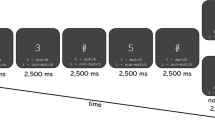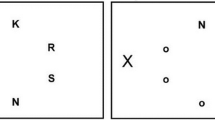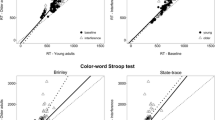Abstract
Age differences in the spatial distribution of attention over a wide field of view have only been described in terms of the spatial extent, leaving the topographical aspect unexplored. This study examined age differences between younger and older adults in good general health in an important topographical characteristic, the asymmetry between the upper and lower visual fields. In Experiment 1, we found age differences across the entire attentional visual field. In addition, age differences were greater in the upper compared to the lower field. In Experiment 2, we examined whether the finding of a greater age difference in the ability to localize a target among distractors in the upper visual field in Experiment 1 was a result of possible differential age differences between the upper and lower visual fields in the ability to localize a target even when there was no distractor competing for attention. Our results suggested that the age differences we observed were linked to age differences in the ability to filter out distractors that compete with the target for attention rather than the ability to process only the target over a wide field of view. While younger adults demonstrated an upper visual field advantage in the ability to localize a target among distractors, there was no such field advantage in older adults. We discuss this finding of diminished upper visual field advantage in older adults in light of an account of pervasive loss of neural specialization with age. We postulate that one possible explanation of age differences in the asymmetry between the upper and lower visual fields may be an adaptation to age-related physical decline. We also discuss important implications of our findings in risks of falls and vehicle crashes.


Similar content being viewed by others
References
Aubrey JB, Dobbs AR (1989) Age and sex differences in the mental realignment of maps. Exp Aging Res 16:133–139
Ball KK, Beard BL, Roenker DL, Miller RL, Griggs DS (1988) Age and visual search: expanding the useful field of view. J Opt Soc Am A 5:2210–2219
Böckler A, Knoblich G, Sebanz N (2011) Giving a helping hand: effects of joint attention on mental rotation of body parts. Exp Brain Res 211:531–545
Bouma H (1970) Interaction effects in parafoveal letter recognition. Nature 226:177–178
Braithwaite JJ, Humphreys GW, Hullleman J (2005) Color-based grouping and inhibition in visual search: evidence from a probe detection analysis of previous search. Percept Psychophys 67(1):81–101
Chambers KW, McBeath MK, Schiano DJ, Metz EG (1999) Tops are more salient than bottoms. Percept Psychophys 61(4):625–635
Chan AHS, So DKT (2007) Shape characteristics of useful field of view and visual search time. Trav Hum 70:343–368
Clay OJ, Wadley VG, Edwards JD, Roth DL, Roenker DL, Bail KK (2005) Cumulative meta-analysis of the relationship between useful field of view and driving performance in older adults: current and future implications. Optom Vis Sci 82:724–731
Costello MC, Madden DJ, Shepler AM, Mitroff SR, Leber AB (2010) Age-related preservation of top-down control over distraction in visual search. Exp Aging Res 36:249–272
Danckert JG, Goodale MA (2003) Ups and downs in the visual control of action. In: Johnson-Frey SH (ed) Taking action: cognitive neuroscience perspectives on intentional acts. The MIT Press, Cambridge, pp 29–64
Desrocher M, Smith ML (2005) Intrapersonal and extrapersonal space: performance of older adults on ecologically valid orientation tasks. Exp Aging Res 31:205–216
Di Fabio RP, Zampieri C, Henke J, Olson K, Rickheim D, Russell M (2005) Influence of elderly executive cognitive function on attention in the lower visual field during step initiation. Gerontology 51:94–107
Farver PF, Farver TB (1982) Performance of normal older adults on tests designed to measure parietal lobe functions. Am J Occup Ther 36:444–449
Fecteau JH, Enns JT, Kingstone A (2000) Competition-induced visual field differences in search. Psychol Sci 11:386–393
Feng J, Spence I (2014) Upper visual field advantage in localizing a target among distractors. i-Perception 5:97–100
Folk CL, Lincourt AE (1996) The effects of age on guided conjunction search. Exp Aging Res 22:99–118
Folstein MF, Folstein SE, McHugh PR (1975) “Mini-mental state”. A practical method for grading the cognitive state of patients for the clinician. J Psychiatr Res 12(3):189–198
Gaspar JM, McDonald JJ (2014) Suppression of salient objects prevents distraction in visual search. J Neurosci 34(16):5658–5666
Goodale MA, Milner AD (1992) Separate visual pathways for perception and action. Trends Neurosci 15:20–25
Grady CL, Haxby JV, Horwitz B, Ungerleider LG, Schapiro MB, Carson RE, Herscovitch P, Mishkin M, Rapoport SI (1992) Dissociation of object and spatial vision in human extrastriate cortex: age-related changes in activation of regional cerebral blood flow measured with water and positron emission tomography. J Cogn Neurosci 4:23–34
Hartley AA (2001) Age differences in dual-task interference are localized to response generation processes. Psychol Aging 16:47–54
Hartley AA, Speer NK, Jonides J, Reuter-Lorenz PA, Smith EE (2001) Is the dissociability of working memory systems for name identity, visual-object identity, and spatial location maintained in old age? Neuropsychology 15:3–17
Hassan SE, Turano KA, Muñoz B, Munro C, Roche KB, West SK (2008) Cognitive and vision loss affects the topography of the attentional visual field. Invest Ophthalmol Vis Sci 49:4672–4678
Kastner S, Ungerleider LG (2000) Mechanisms of visual attention in the human cortex. Annu Rev Neurosci 23:315–341
Kastner S, De Weerd P, Desimone R, Ungerleider LG (1998) Mechanisms of directed attention in the human extrastriate cortex as revealed by functional MRI. Science 282:108–111
Kramer AF, Hahn S, Gopher D (1999) Task coordination and aging: explorations of executive control processes in the task switching paradigm. Acta Psychol 101:339–378
Kray J, Li KZ, Lindenberger U (2002) Age-related changes in task-switching components: the role of task uncertainty. Brain Cogn 49:363–381
Kristjánsson Á (2011) The intriguing interactive relationship between visual attention and saccadic eye movements. In: Liversedge SP, Gilchrist ID, Everling S (eds) The Oxford handbook of eye movement. Oxford University Press, New York, pp 455–470
Liversedge SP, Gilchrist ID, Everling S (2011) The Oxford handbook of eye movement. Oxford University Press, New York, NY
Lord SR, Sherrington C, Menz HB (2001) Falls in older people. Cambridge University Press, Cambridge
Lustig C, Hasher L, Zacks RT (2007) Inhibitory deficit theory: recent developments in a “new view”. In: Gorfein DS, MacLeod CM (eds) Inhibition in cognition. American Psychological Association, Washington, DC, pp 145–162
Maljkovic V, Nakayama K (1994) Priming of pop-out: I. Role of features. Mem Cogn 22:657–672
McCalley LT, Bouwhuis DG, Juola JF (1995) Age changes in the distribution of visual attention. J Gerontol 50B:316–331
McCarley JS, Yamani Y, Kramer AF, Mounts JRW (2012) Age, clutter, and competitive selection. Psychol Aging 27(3):616–626
McCourt ME, Leone LM, Blakeslee B (2015) Brightness induction and suprathreshold vision: effects of age and visual field. Vis Res 106:36–46
Mittenberg W, Seidenberg M, O’Leary DS, DiGiulio DV (1989) Changes in cerebral functioning associated with normal aging. J Clin Exp Neuropsychol 11:918–922
Müller HJ, von Mühlenen A, Geyer T (2007) Top-down inhibition of search distractors in parallel visual search. Percept Psychophys 69(8):1373–1388
Owsley C, McGwin G (2004) Association between visual attention and mobility in older adults. J Am Geriatr Soc 52:1901–1906
Park DC, Polk TA, Park R, Minear M, Savage A, Smith MR (2004) Aging reduces neural specialization in ventral visual cortex. Proc Natl Acad Sci USA 101:13091–13095
Pinsk MA, Kastner S, Desimone R, Ungerleider LG (1999) An estimate of receptive field size in human visual cortex. NeuroImage 9:5885
Previc FH (1990) Functional specialization in the lower and upper visual fields in humans: its ecological origins and neurophysiological implications. Behav Brain Sci 13:519–575
Salzman B (2010) Gait and balance disorders in older adults. Am Fam Physician 82:61–68
Scialfa CT, Kline DW, Lyman B (1987) Age differences in target identification as a function of retinal location and noise level: examination of the useful field of view. Psychol Aging 2:14–19
Seiple W, Szlyk JP, Yang S, Holopigian K (1996) Age-related functional field loses are not eccentricity dependent. Vis Res 36:1859–1866
Sekuler AB, Bennett P, Mamelak M (2000) Effects of aging on the useful field of view. Exp Aging Res 26:103–120
Spence I, Jia A, Feng J, Elserafi J, Zhao Y (2013) How speech modifies visual attention. Appl Cogn Psychol 27(5):633–643
Webber RJ, Charlton JL (2001) Way finding in older adults. Clin Gerontol 23:168–172
West SK, Hahn DV, Baldwin KC, Duncan DD, Munoz BE, Turano KA, Hassan SE, Munro CA, Bandeen-Roche K (2010) Older drivers and failure to stop at red lights. J Gerontol 65A:179–183
Whiting WL, Madden DJ, Pierce TW, Allen PA (2005) Searching from the top down: ageing and attentional guidance during singleton detection. Q J Exp Psychol 58A(1):72–97
Whitney D, Levi DM (2011) Visual crowding: a fundamental limit on conscious perception and object recognition. Trends Cogn Sci 15:160–168
Wolfe JM, Butcher SJ, Lee C, Hyle M (2003) Changing your mind: on the contributions of top-down and bottom-up guidance in visual search for feature singletons. J Exp Psychol Hum Percept Perform 29(2):483–502
Yang Q, Kapoula Z (2006) The control of vertical saccades in aged subjects. Exp Brain Res 171:67–77
Zento TP, Pan P, Liu H, Bollinger J, Nobre AC, Gazzaley A (2011) Age-related changes in orienting attention in time. J Neurosci 31:12461–12470
Acknowledgments
Experiment 1 was completed when Dr. Jing Feng was a postdoctoral fellow at the Rotman Research Institute, Baycrest Center for Geriatric Care. Experiment 2 was conducted in North Carolina State University. Dr. Gary Naglie is supported by the George, Margaret and Gary Hunt Family Chair in Geriatric Medicine, University of Toronto.
Author information
Authors and Affiliations
Corresponding author
Additional information
Responsible editor: H.-W. Wahl.
Rights and permissions
About this article
Cite this article
Feng, J., Craik, F.I.M., Levine, B. et al. Differential age-related changes in localizing a target among distractors across an extended visual field. Eur J Ageing 14, 167–177 (2017). https://doi.org/10.1007/s10433-016-0399-7
Published:
Issue Date:
DOI: https://doi.org/10.1007/s10433-016-0399-7




